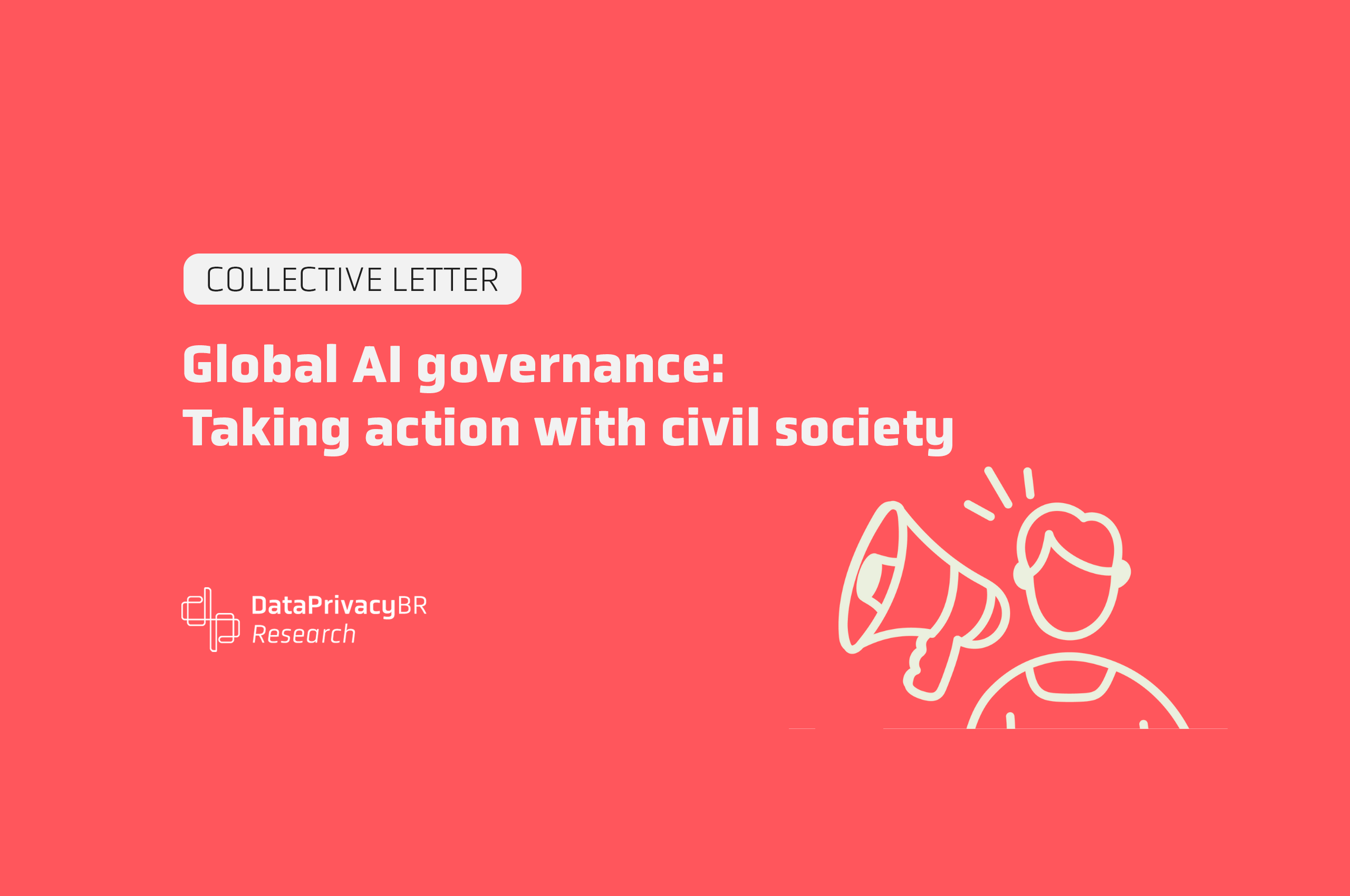Global AI governance: Taking action with civil society
More than 40 civil society organizations call for inclusion in AI Action Summit in letter on global governance of Artificial Intelligence.
An inclusive AI Action Summit
The third wheel
AI has been profoundly transforming numerous areas of our lives, including access to online information and certain public services. It is thus crucial that the plurality of viewpoints of the players that make up society, with their cultural, social and ethical differences, and their diverse economic and geopolitical concerns, be represented. All too often, however, the mobilisation of civil society does not go beyond the consultation stage. Typically, its voice is only heard once the decisions have been taken, in a performative and tick-the-box manner.
The public consultation organised ahead of the summit demonstrated once again the value of involving civil society in global AI governance efforts. Defining the common good in the age of artificial intelligence requires the participation of all sections of society and the representation of the various interests at stake, in addition to those of private and state players. If this participation is to be effective, civil society representatives must be given a permanent seat at the table.
Equal legitimacy with other stakeholders
Civil society is a key stakeholder, able to challenge the goals and claims of players defending their own interests. In the case of AI governance, it brings specific evidence and expertise and an indispensable perspective, particularly at three levels.
First, it acts as a whistleblower. It raises awareness and calls attention to key issues that would otherwise be overlooked: respect for fundamental rights and freedoms, biases leading to discrimination against minorities or populations that are already vulnerable, the effects of “addictive” recommendation algorithms on young people’s mental health. Second, it helps to define methods for assessing these issues and devising solutions, in the public interest, and carries out in-depth investigations, building on lessons learned from other sectors. Last but not least, it provides expertise in human rights and ethics, as well as technical expertise.
Our call to action
In the field of AI governance, as in many other areas, limited funding, opaque selection processes and the risks of instrumentalisation undermine civil society’s ability to participate effectively. In the run-up to the Paris AI Action Summit, we request organisers to urgently implement three concrete measures to strengthen and facilitate the involvement of civil society in AI governance, during and especially after the summit:
1 – Support more open and transparent selection processes
Clarifying and opening the selection processes for civil society’s participation in expert groups (in standardisation processes, within the European commission, etc.) and making them public is essential to ensure fair representation and restore trust. Opportunities for civil society participation should also be widened: we recommend opening up these participation spaces organised by public authorities or private players to a wider spectrum of organisations, beyond the most established ones.
2 – Impose a duty to respond to contributions
There are often no mechanisms in place to ensure that civil society contributions are actually taken into account. We call on the summit participants to encourage the establishment of clear mechanisms for feedback and reporting on the integration of civil society inputs into AI-related policies and practices.
3 – Facilitate funding
Many civil society organisations have extremely limited resources. Setting up dedicated funds or processes to encourage their funding, would enable them to contribute effectively and sustainably to AI governance efforts.
Simply consulting civil society in a superficial manner or highlighting its presence through media operations is no longer enough. It is now time to give civil society representatives a full and permanent seat at the table, so that they can become leading partners in the development of policies and guidelines, and in adjusting AI tools. The Paris AI Action Summit provides an opportunity to rebalance the powers between all the players who should have a say in the global governance of AI. Let’s not miss it.
List of signatories
Jessica Galissaire, Studies Manager, Renaissance Numérique
Rémy Gerbet, Executive Director, Wikimedia France
Justine Atlan, Executive Director, Association e-Enfance/3018
Gary Marcus, Professor Emeritus, New York University
Sarah Andrew, Legal and Campaign Director, Avaaz
Anna Wohlfarth, Executive Director, interface
Vanja Skoric, Program Director, European Center for Not-For-Profit Law
Karine Caunes, Executive Director, Digihumanism – Centre for AI and Digital Humanism
Matthias Spielkamp, Executive Director, AlgorithmWatch
Gbenga Sesan, Executive Director, Paradigm Initiative
Mariana Rielli, Director, Data Privacy Brasil
Nicolas Chagny, President, Internet Society (ISOC) France
Karine Gentelet, Scientific Director, in charge of Relationships with Civil Society, OBVIA
Angela Mueller, Executive Director, AlgorithmWatch CH
Jeni Tennison, Executive Director, Connected by Data
Jean-François Lucas, General Manager, Renaissance Numérique
Mélusine Blondel, Co-Director, La Mednum
Jann Büscher, Co-Director, La Mednum
David Evan Harris, Chancellor’s Public Scholar, University of California, Berkeley
Valérie Fernandez, Professor & RD-ID Chair, Télécom Paris
Damien Jacob, Guest Lecturer, ULiege
Stephen Russel, Director General, ANEC (The European consumer voice in standardisation)
Alice Stollmeyer, Founder & Executive Director, Defend Democracy
Anna Obem, Managing Director, Panoptykon Foundation
Tania Duarte, Founder, We and AI
Rachel Coldicutt OBE, Executive Director, Careful Trouble
Kim Thompson, Founder, United We Rise UK
Kyle Taylor, Founder, Fair Vote UK
Ryan Carrier, Executive Director, ForHumanity
Ben Stewart, Founder/Managing Director, Caution Your Blast Ltd.
Maxime Fournes, Co-Founder, Engineer and AI Researcher, PauseIA
Irénée Régnauld, Associate Researcher, COSTECH (Connaissance, organisation et systèmes techniques) Lab, Université de Technologie de Compiègne
Dr Nora Ni Loideain, Director, Information Law & Policy Centre, Institute of Advanced Legal Studies, University of London
Yonah Welker, EU Commission projects evaluator, rapporteur, prev. tech envoy, ministry of AI advisor
Martin Parker, Professor of organization studies, University of Bristol Business School
Anthony Masure, Associate Professor, Haute école d’art et design de Genève (HEAD, HES-SO)
Sara (Meg) Davis, Professor, Centre for Interdisciplinary Methodologies, University of Warwick
Simon Buckingham Shum, Professor of Learning Informatics, University of Technology Sydney
Mike Podmore, CEO, STOPAIDS
Maria Farrell, Writer and Speaker
Peter Flach, Professor of Artificial Intelligence, University of Bristol
Luke Stark, Assistant Professor, Faculty of Information & Media Studies (FIMS), Western University, London, Ontario
Yaniv Benhamou, Professor, Lawyer, IT Law, Digital Law Center, Université de Genève
Veja também
-
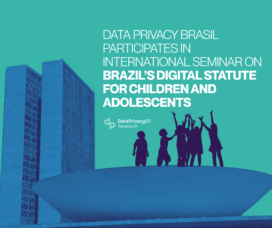
Data Privacy Brasil participates in international seminar on Brazil’s Digital Statute for Children and Adolescents
Yesterday, Data Privacy Brasil took part in the seminar “Online Safety for Children Statute: Lessons from the Brazilian Experience”, organized by Digital Action and Conectas Human Rights. Check out our report featuring the key highlights from the event.
-

Brazilian Senate approves Landmark Digital Child Protection Bill: what are the next steps?
On 27 August 2025, Brazil's Senate approved Bill PL 2628/2022, focused on protecting the rights of children in digital platforms. What happens now?
-
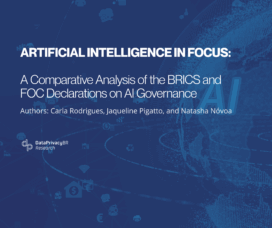
Artificial Intelligence in Focus: A Comparative Analysis of the BRICS and FOC Declarations on AI Governance
The BRICS Leaders' Declaration on Global Governance of Artificial Intelligence has gained prominence in both Brazilian and international media, as it represents a joint position by Global South countries in the ongoing contest over this emerging technology.
-

AI Explainability: How to Avoid Rubber-Stamping Recommendations
Experts debate if human oversight can replace the need for the explainability of AI systems. Bruno Bioni, co-director of Data Privacy Brasil, was one of the experts interviewed. Check it out in the text!
-

Digital Merger Watch: Data Privacy Brasil joins new global initiative
The group includes national and international organizations and will focus on analyzing and challenging Big Tech’s efforts to reinforce its dominance through mergers and acquisitions.
-

Beyond Digital Rights: Towards a Fair Information Ecosystem?
One of the major challenges in the field of digital rights is the tendency toward segmentation and hyper-specialization in topics such as privacy, freedom of expression, net neutrality, data protection, and the regulation of AI systems. Learn more about the topic in the article published in Tech Policy.
-
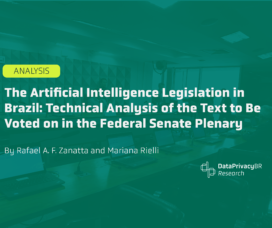
The Artificial Intelligence Legislation in Brazil: Technical Analysis of the Text to Be Voted on in the Federal Senate Plenary
The Internal Temporary Artificial Intelligence Committee (CTIA) of the Federal Senate approved the substitute report for Bill 2338/2023. This bill aims to define the legal framework for regulating the use of Artificial Intelligence systems in Brazil.
Veja Também
-

Data Privacy Brasil participates in international seminar on Brazil’s Digital Statute for Children and Adolescents
Yesterday, Data Privacy Brasil took part in the seminar “Online Safety for Children Statute: Lessons from the Brazilian Experience”, organized by Digital Action and Conectas Human Rights. Check out our report featuring the key highlights from the event.
-

Artificial Intelligence in Focus: A Comparative Analysis of the BRICS and FOC Declarations on AI Governance
The BRICS Leaders' Declaration on Global Governance of Artificial Intelligence has gained prominence in both Brazilian and international media, as it represents a joint position by Global South countries in the ongoing contest over this emerging technology.
-

AI Explainability: How to Avoid Rubber-Stamping Recommendations
Experts debate if human oversight can replace the need for the explainability of AI systems. Bruno Bioni, co-director of Data Privacy Brasil, was one of the experts interviewed. Check it out in the text!
-

Digital Merger Watch: Data Privacy Brasil joins new global initiative
The group includes national and international organizations and will focus on analyzing and challenging Big Tech’s efforts to reinforce its dominance through mergers and acquisitions.
-

Beyond Digital Rights: Towards a Fair Information Ecosystem?
One of the major challenges in the field of digital rights is the tendency toward segmentation and hyper-specialization in topics such as privacy, freedom of expression, net neutrality, data protection, and the regulation of AI systems. Learn more about the topic in the article published in Tech Policy.
-

The Artificial Intelligence Legislation in Brazil: Technical Analysis of the Text to Be Voted on in the Federal Senate Plenary
The Internal Temporary Artificial Intelligence Committee (CTIA) of the Federal Senate approved the substitute report for Bill 2338/2023. This bill aims to define the legal framework for regulating the use of Artificial Intelligence systems in Brazil.
-
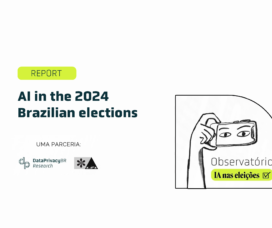
AI in the 2024 Brazilian elections
Aláfia Lab, *desinformante and Data Privacy Brasil launch the report “AI in the 2024 Brazilian elections”, with an analysis of the use of artificial intelligence in the first round of the elections.
-

A Fragmented Landscape Is No Excuse for Global Companies Serious About Responsible AI
For the third year in a row, MIT Sloan Management Review and Boston Consulting Group (BCG) have brought together an international panel of AI experts to help gain insights into the lack of alignment around global standards and norms for responsible AI. Bruno Bioni, co-director of Data Privacy Brasil, was one of the experts interviewed. Check it out in the text!
-

Research Project Outcomes: A vision for inclusive educational technology
Check out Júlia Mendonça's interview for Tech Ethics Lab, about the use of technology in schools.
-
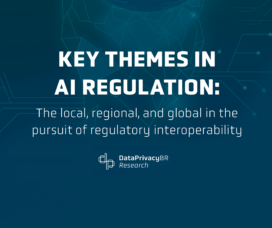
Key Themes in AI Regulation: The local, regional, and global in the pursuit of regulatory interoperability
Data Privacy Brasil releases its report “KeyThemes in AI Regulation: The local, regional, and global in the pursuit of regulatory interoperability,” supported by the Heinrich Böll Foundation. This work is the result of months of research under the project “Where the SabIA Sings: Governance and Regulation of Artificial Intelligence from Brazil”.
-
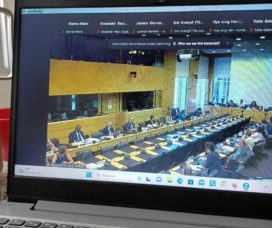
Data Privacy Brasil participates in UN’s OHCHR briefing on Brazil
The organization highlighted how the advance of edtech has been violating children’s privacy in the country
DataPrivacyBr Research | Content under licensing CC BY-SA 4.0

